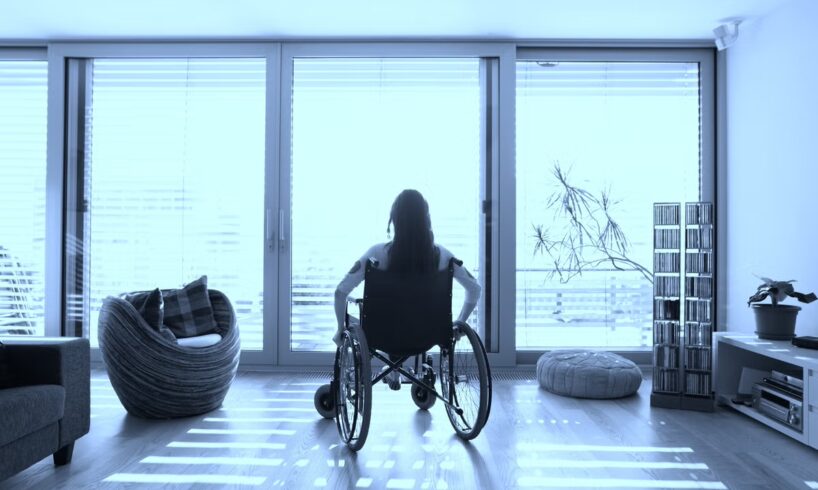
Sign up for the Independent Women email for the latest news, opinion and features
Get the Independent Women email for free
Get the Independent Women email for free
No privacy online, surveillance at home and no control over her money or medical appointments – this was the reality of life for one woman who endured years of abuse by her partner through technology.
She is one of the increasing number of disabled people leading charity Refuge say who are facing the “devastating” impact of tech-facilitated domestic abuse.
Sarah, who is a wheelchair user in her forties and has had her name changed for safety reasons, depended on her then-partner to help with her ongoing medical needs, but was instead abused “relentlessly”.
“I had no privacy at all,” she told The Independent. “He had access to all my accounts, my bank account – everything.
“The worst thing was him cancelling my hospital appointments, he would tell the hospital I was too poorly, it wasn’t true, but he wouldn’t let me. I would then have to wait months to be seen.”
open image in gallery
Sarah found herself monitored constantly, with control of her benefits and hospital appointments handed over to her abuser (stock image) (Getty Images)
Using her phone and the smart devices within the home, he would monitor her movements, calls and interactions with others. His access to her media accounts, emails, and online banking left her with no privacy.
She said his use of technology endangered her health, as he intercepted texts and emails from her GP and hospital through the NHS app, often cancelling her appointments without her consent and restricting her access to medication.
“He took control over my medication, making out that I would forget to take them, even though they were in a box labelled with the dates on,” Sarah added.
“I manage to take them now with no issues. He then kept telling me I had taken my pain medication – I knew full well I hadn’t. But he did that because he liked seeing me in pain. It was relentless.”
Sarah was trapped financially, as her benefits and disability payments were also redirected to her abuser’s account. She was left without any money to pay for any essentials, including toiletries, and often the home was without food.
“I got so embarrassed, never having enough food in the house or even shampoo to wash my hair,” she said. “Then he would call me names and put me down.”
open image in gallery
Sarah was trapped financially, as her benefits and disability payments were also redirected to her abuser’s account (stock image) (Getty Images)
After enduring years of abuse, she reached out to Refuge and was allocated someone to support her. Sarah was able to call a helpline on a specific device, where she was linked in with adult social care. She was later moved to supported living, able to regain control of her finances and set up new safe accounts.
She said: “Thank god I built up the courage to call for help, it took me so long to call, I wish I had done it sooner. The support has been so incredible.”
Emma Pickering, the head of the technology-facilitated abuse and economic empowerment team at Refuge, said the current “epidemic” of violence against women and girls (VAWG) is increasingly being mediated through technology.
Her team has seen a 205 per cent increase in referrals over six years, which she says “represents just the tip of the iceberg”.
“This is having a devastating impact on disabled survivors, who are uniquely affected by tech and economic abuse, often with severe consequences for their mental health,” she said.
“By exploiting a survivor’s disability, perpetrators may have greater opportunities to exert coercive control. Among other insidious behaviours, we have heard of perpetrators abusing their role as carers by weaponising technology.”
open image in gallery
Refuge said the current epidemic of violence against women and girls is increasingly being mediated through technology (stock image) (Alamy/PA)
She said the team had seen examples from abusers accessing online banking platforms to steal a survivor’s private funds and state benefits, to using medical technology such as health tracking apps for surveillance purposes, and preventing survivors from attending medical appointments by taking control of their NHS app.
Economic abuse is another significant issue faced by disabled survivors, with the team frequently told about problems related to joint bank accounts – such as survivors having no access to a bank card, never being allowed to view bank statements, and in some cases, debts put in their name.
She said: “For many disabled survivors, adaptive home technologies are a lifeline – yet even these can be misused by abusers, who may take this critical technology away to further isolate and control the survivor.”
Ms Pickering urged the government to ensure the upcoming VAWG strategy set out a “comprehensive framework for tackling tech abuse, with policy solutions that are shaped in consultation with survivors”.
A Home Office spokesperson said: “Tackling VAWG in all of its forms, including when it takes place online or is facilitated by technology, is a top priority for this government.
“The VAWG strategy will set out the strategic direction and concrete actions to deliver on the government’s ambition to halve VAWG in a decade, and will include measures to tackle online and technology-facilitated VAWG.”
You can read Refuge’s full report on tech-enabled abuse here.
The national domestic abuse helpline offers support for women on 0808 2000 247, or you can visit the Refuge website. There is a dedicated men’s advice line on 0808 8010 327.





